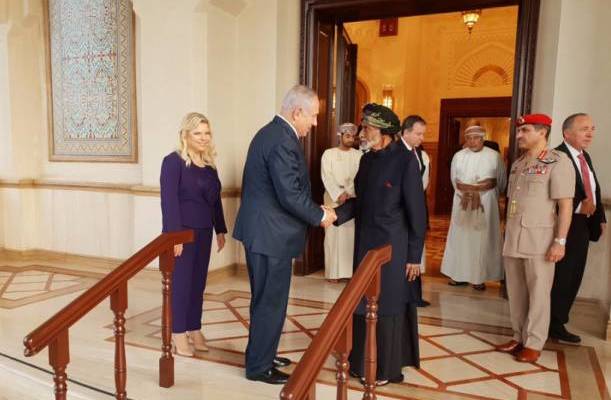Netanyahu’s visit to Oman is the first Israeli official meeting at this level since 1996.
By: United with Israel Staff
Prime Minister Benjamin Netanyahu and several Israeli security leaders visited Oman on Thursday for an unannounced official diplomatic visit to Gulf country, where Netanyahu met with Sultan Qaboos bin Said, the country’s leader.
Netanyahu and his wife were invited to visit by Oman’s ruler, Sultan bin Said, after lengthy contacts between the two countries, reportedly conducted through Israel’s Mossad espionage agency.
Netanyahu’s visit to Oman is the first Israeli official meeting at this level since 1996, when Shimon Peres made the visit.
Mossad Director Yossi Cohen, National Security Adviser and National Security Council Director Meir Ben-Shabbat, Foreign Ministry Director General Yuval Rotem, the head of the Prime Minister’s staff, Yoav Horowitz, and the Prime Minister’s Military Secretary, Brig.-Gen. Avi Bluth also participated in the visit.
In the joint statement following the visit, it was noted that among the issues discussed were ways to advance the peace process in the Middle East as well as several matters of joint interest regarding the achievement of peace and stability in the Middle East.
Oman maintains close ties with Iran, and it is assumed that Israel conveyed messages to the Islamic Republic through Oman.
‘A Special Visit to Oman — Making History!’
“The Prime Minister’s visit is a significant step in implementing the policy outlined by Prime Minister Netanyahu on deepening relations with the states of the region while leveraging Israel’s advantages in security, technology and economic matters,” Netanyahu’s office stated after the meeting.
Oman state TV carried images of the two leaders meeting and Netanyahu shared a video of his visit on his official social media accounts, calling it “a special visit to Oman — making history!”
Israel and Oman do not have diplomatic relations.
“We always thought that if we solved the Palestinian problem, it would open up the doors to peace with the broader Arab world. And that’s certainly true, if you could do it,” said Netanyahu.
“But it may mean that equally true and perhaps even truer is that if you open up to the Arab world and you normalize relations with them,” he continued, “it will open the door for an eventual reconciliation and peace with the Palestinians.”
Days before Netanyahu’s visit, Palestinian leader Mahmoud Abbas also visited Oman, raising the possibility that Oman might be trying to help revive negotiations or push forward a US peace plan.
Netanyahu has repeatedly stated in recent years that Israel has developed good relations with several Arab states. However, this publicized visit is a rarity.
“Israel is facing many challenges but while doing so is also “acquiring friends around the world and within the region here,” Netanyahu stated in September at a toast for Rosh Hashana, the Jewish New Year, with Prime Minister’s Office personnel. He noted that “we live in a challenging area – and we are equal to the task.”
“They see our strength and they see our commitment to defend our state, to develop it,and become an economic, technological, military and intelligence power, and this brings us friends,” he explained.
AP contributed to this report.
